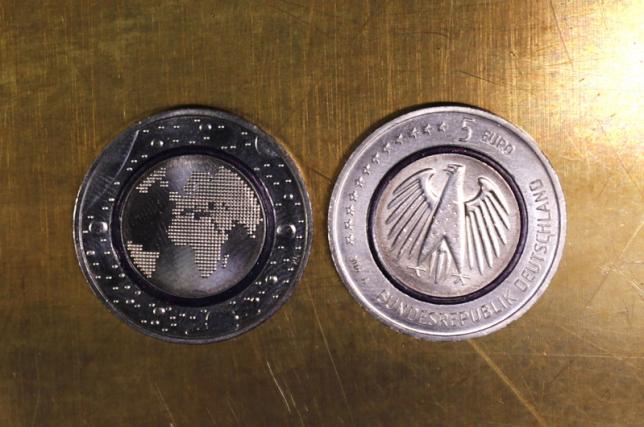Five-euro coin valid only in Germany taps into D-Mark nostalgia

BERLIN - A limited edition five-euro coin issued by Germany's Bundesbank has tapped into a deep sense of nostalgia among Germans for Deutschmarks, to which the newly minted money bears a close resemblance.
Germany's old five-Mark coin was a favorite among households until the national currency was physically replaced with euro notes and coins in 2002.
A rush for the five-euro coins, leading people to queue for almost an hour at the Bundesbank's Berlin office on Tuesday, has coincided with antipathy among conservatives towards the euro's guardian, the European Central Bank.
"The euro is, at the moment, good for our export economy," said Joerg Mueller as he waited. "But we're worried about the southern euro countries. Italy is saddled with debt and France isn't much better."
Many Germans were reluctant to give up the Deutschmark, which symbolized Germany's post-war economic revival. The Bundesbank estimates that 12.9 billion Marks (worth 6.6 billion euros or $7.48 billion) were still being hoarded at the end of 2015. They can still be exchanged for euros at any time.
Dubbed the five-euro 'Planet Earth' coins, the new euros bear a picture of the world and the cosmos beyond on one side, and on the other a large eagle - just like the old five-Mark coin popularly known as the "Heiermann".
"Germany has got its Heiermann back," wrote Manager Magazin, recalling fondly how Germans used to use the five-Mark coins to buy cigarettes from vending machines, or else squirreled them away to save up for holidays.
That thriftiness is at the root of discontent among Chancellor Angela Merkel's conservatives with the low-interest rates policies of the ECB, which they complain are creating a "gaping hole" in savers' finances as returns have dropped.
Finance Minister Wolfgang Schaeuble told Reuters last week the ECB's low rates were causing "extraordinary problems" for German banks and pensioners. Some conservatives have called for the next ECB president to come from Germany.
As well as bearing the eagle - a national symbol - and a distinguishing blue ring, the five-euro coins have another special characteristic: They are legal tender in Germany only. A quirk of European law means this is possible.
The Bundesbank says 2.25 million of the five-euro coins have been minted, of which it says 250,000 are "collector quality coins with a proof-like finish".
Sales are limited to one per person per day. Some of those in the queue said they were back for the second or third day.
Simone Schmieding, who bought one of the coins in Berlin, said: "It's a limited edition, and the blue ring makes it really special."
People have been bidding up the coins' value on online auction sites. On Tuesday, one batch of five of those with the special finish sold for 216 euros ($244.73).
The limited volume of the edition means the demand appears to have more to do with the coins' attractiveness to collectors than any move into them as a proxy Deutschmark to use instead of regular euros.
"I suspect the demand has more to do with collecting a limited-edition item than a macro run on the currency," said Andrew Bosomworth, a senior portfolio manager at Pimco. -Reuters







